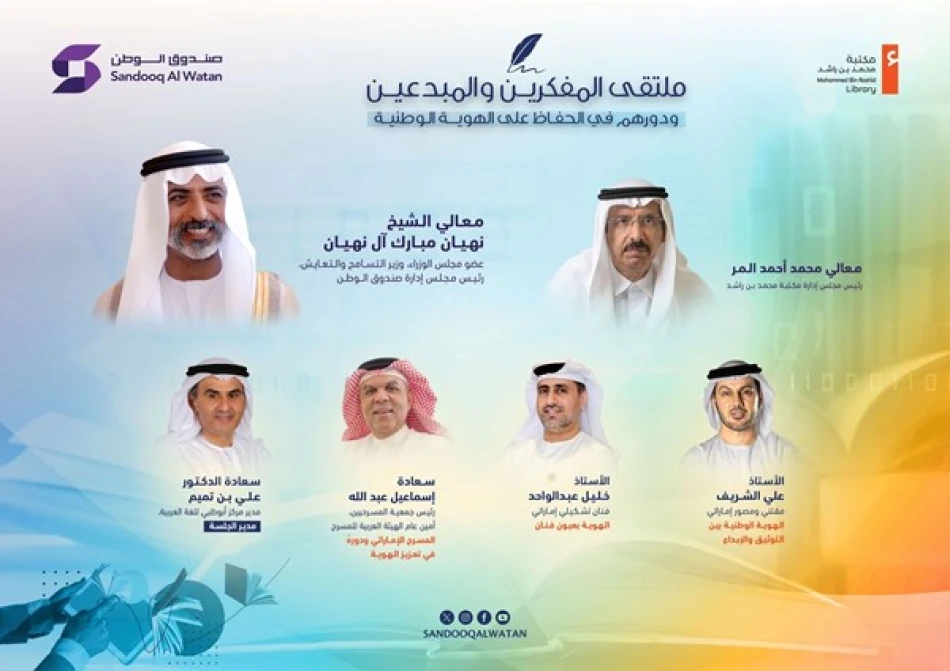
Sheikh Nahyan Inaugurates National Identity Forum Empowering Thinkers and Innovators
UAE Mobilizes Creative Elite to Fortify National Identity Against Modern Challenges
The UAE is launching an ambitious initiative to harness its intellectual and creative communities as cultural guardians, recognizing that artists, writers, and designers play a crucial role beyond entertainment—they shape national consciousness. The "Thinkers and Creators Forum" opening Tuesday represents a strategic pivot toward cultural soft power, positioning creativity as essential infrastructure for national resilience in an era of rapid globalization.
Strategic Cultural Investment Takes Center Stage
Sheikh Nahyan bin Mubarak Al Nahyan, Minister of Tolerance and Coexistence and Chairman of the Nation Fund, will inaugurate the forum at the Mohammed bin Rashid Al Maktoum Library in Dubai. The gathering brings together an elite roster of Emirati intellectuals, visual and performing artists, craftspeople, heritage specialists, designers, and content creators—signaling the government's recognition that cultural production requires the same strategic attention as economic diversification.
This approach mirrors successful cultural strategies in Singapore and South Korea, where governments systematically invested in creative industries to build distinctive national brands while preserving cultural authenticity amid rapid modernization.
Beyond Art: Creators as Nation-Builders
The forum explicitly positions creative professionals as partners in executing the Nation Fund's vision for "a strong and sustainable national identity." This partnership model suggests the UAE is moving beyond traditional patronage toward genuine collaboration, where artists and intellectuals help shape policy rather than simply implement it.
The "Our Life in the UAE" Platform
Central to the forum is promoting the "Our Life in the UAE" initiative, which creates a nationwide platform for citizens to express their experiences and emotions about the country. This crowdsourced approach to national narrative-building represents a sophisticated understanding of how identity formation works in the digital age—bottom-up rather than top-down.
Institutional Integration Through "Tolerance Pulse"
The forum will also spotlight the "Tolerance Pulse" competition involving 101 tolerance committees across federal and local government entities. This systematic embedding of cultural values within bureaucratic structures demonstrates how the UAE is institutionalizing soft power, ensuring cultural initiatives aren't merely ceremonial but operationally integrated.
Structured Dialogue for Measurable Outcomes
The forum's architecture reveals serious intent beyond symbolic gestures. The first session, moderated by Dr. Ali bin Tamim from the Abu Dhabi Arabic Language Centre, will feature theater artist Ismail Abdullah discussing Emirati theater's role in identity formation, visual artist Khalil Abdulwahid exploring identity through artistic perspective, and photographer Ali Al Sharif examining the documentation versus creative interpretation of national landmarks.
The second session focuses on practical implementation, with Nation Fund Director General Yasser Al Qarqawi presenting initiatives that have achieved significant social impact, joined by writer Nadia Al Najjar, Abu Dhabi Youth Council President Saif Al Mansoori, and student Zayed Al Balushi representing university-based national identity clubs.
Long-term Strategic Implications
This initiative arrives as the UAE positions itself as a global cultural hub, with major investments in museums, cultural districts, and creative industries. By systematically engaging local creative talent in identity formation, the country is building cultural authenticity to complement its international ambitions—a balance other Gulf states have struggled to achieve.
The forum's emphasis on specialized committees to define collaboration frameworks suggests this isn't a one-time event but the foundation for ongoing institutional relationships between government and creative sectors. This model could influence how other nations approach cultural policy in an era where soft power increasingly determines global influence.
Al Qarqawi's acknowledgment of the Mohammed bin Rashid Al Maktoum Library Foundation's role underscores how cultural infrastructure serves strategic purposes beyond education—it becomes the physical space where national identity is actively constructed and reconstructed for each generation.
Most Viewed News

 Layla Al Mansoori
Layla Al Mansoori






